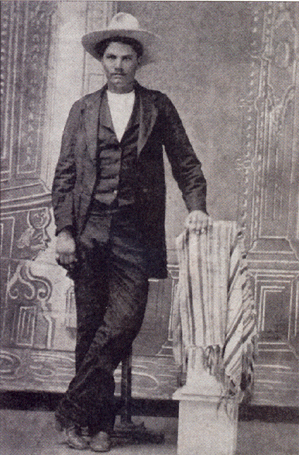John Wesley Hardin in popular culture: Difference between revisions
Citation bot (talk | contribs) Added publisher. | Use this bot. Report bugs. | Suggested by Spinixster | Category:Cultural depictions of American people | #UCB_Category 121/328 |
→In music: add cite |
||
| Line 36: | Line 36: | ||
Country music singer [[Johnny Cash]] wrote and recorded a song about Hardin titled "Hardin Wouldn't Run,"<ref>[https://genius.com/Johnny-cash-hardin-wouldnt-run-lyrics Johnny Cash – Hardin Wouldn't Run – Lyrics] at genius.com</ref> released on his 1965 album ''[[Sings the Ballads of the True West|Johnny Cash Sings the Ballads of the True West]].'' |
Country music singer [[Johnny Cash]] wrote and recorded a song about Hardin titled "Hardin Wouldn't Run,"<ref>[https://genius.com/Johnny-cash-hardin-wouldnt-run-lyrics Johnny Cash – Hardin Wouldn't Run – Lyrics] at genius.com</ref> released on his 1965 album ''[[Sings the Ballads of the True West|Johnny Cash Sings the Ballads of the True West]].'' |
||
[[Bob Dylan]] named his 1967 album ''[[John Wesley Harding]]'' after the outlaw, but the name was spelled differently. The title track depicts Hardin as "a friend to the poor" who "was never known to hurt an honest man."{{ |
[[Bob Dylan]] named his 1967 album ''[[John Wesley Harding]]'' after the outlaw, but the name was spelled differently. The title track depicts Hardin as "a friend to the poor" who "was never known to hurt an honest man."<ref>{{cite web| url = https://www.bobdylan.com/songs/john-wesley-harding/| title = “John Wesley Harding” lyrics| author = Dylan, Bob| access-date = May 1, 2024| website = bobdylan.com}}</ref> |
||
Singer-songwriter Wesley Stace uses the stage name [[John Wesley Harding (singer)|John Wesley Harding]].<ref>{{Cite web |url=http://www.metro.us/newyork/entertainment/article/769591--wesley-stace-a-greedy-man |title=Wesley |
Singer-songwriter Wesley Stace uses the stage name [[John Wesley Harding (singer)|John Wesley Harding]].<ref>{{Cite web |url=http://www.metro.us/newyork/entertainment/article/769591--wesley-stace-a-greedy-man |title=Wesley Stace article |access-date=2012-10-15 |archive-url=https://web.archive.org/web/20121112111352/http://www.metro.us/newyork/entertainment/article/769591--wesley-stace-a-greedy-man |archive-date=2012-11-12 |url-status=dead }}</ref> |
||
Hardin is among the outlaws mentioned in the song "[[Cowboy Songs III – Rhymes of the Renegades|Rhymes of the Renegades]]," by western singer-songwriter [[Michael Martin Murphey]].<ref>[http://articles.chicagotribune.com/1994-01-09/entertainment/9401090108_1_cowboy-songs-lonesome-dove-outlaw Chicago Tribune interview with M M Murphey]</ref> |
Hardin is among the outlaws mentioned in the song "[[Cowboy Songs III – Rhymes of the Renegades|Rhymes of the Renegades]]," by western singer-songwriter [[Michael Martin Murphey]].<ref>[http://articles.chicagotribune.com/1994-01-09/entertainment/9401090108_1_cowboy-songs-lonesome-dove-outlaw Chicago Tribune interview with M M Murphey]</ref> |
||
Revision as of 09:21, 1 May 2024

John Wesley Hardin's legacy as an outlaw has made him a colorful character and the subject of various media works from his own time up to the present day. Many people came to know of Hardin through the TV ad for Time-Life Books "Old West" series. During the description of one book in the series The Gunfighters, the well-known claim is made: "John Wesley Hardin, so mean, he once shot a man just for snoring too loud"[1]
Depictions
John Wesley Hardin is a favorite theme in popular culture:
In fiction
Hardin has also been the subject or supporting character of various works about the Old West, such as:
- Streets of Laredo by Larry McMurtry features Hardin. He is depicted as a cold and brutal killer.[2]
- James Carlos Blake wrote The Pistoleer, a novelized version of Hardin published in 1995.[citation needed]
- L. B. McGinnis wrote Reflections in Dark Glass, a novel that was published in 1996.[3]
- Four Sixes To Beat: The Tale of a Killer by Bruce N. Croft is a novel published in 2004.[4]
In film
Hardin has been portrayed on film by:
- John Dehner in the 1951 film The Texas Rangers[5]
- Rock Hudson in the 1953 film The Lawless Breed
- Jack Elam in the 1970 film Dirty Dingus Magee[6]
- Max Perlich in the 1994 film Maverick[7]
- John Wayne's character in The Shootist is loosely based on Hardin.[8]
In television
- Actor Richard Webb played Hardin in a 1954 episode of Jim Davis' television series Stories of the Century. The segment shows Hardin shooting two Indians in the back; gunning down a sheriff in a saloon in Abilene, Kansas; and finally being outgunned himself by an El Paso officer attempting to arrest him.[9]
- In a 1998 episode of Antiques Roadshow, a previously unknown and rare photograph of John Wesley Hardin was appraised at a value from $30,000 to $50,000.[10]
In music
Country music singer Johnny Cash wrote and recorded a song about Hardin titled "Hardin Wouldn't Run,"[11] released on his 1965 album Johnny Cash Sings the Ballads of the True West.
Bob Dylan named his 1967 album John Wesley Harding after the outlaw, but the name was spelled differently. The title track depicts Hardin as "a friend to the poor" who "was never known to hurt an honest man."[12]
Singer-songwriter Wesley Stace uses the stage name John Wesley Harding.[13]
Hardin is among the outlaws mentioned in the song "Rhymes of the Renegades," by western singer-songwriter Michael Martin Murphey.[14]
References
- ^ Trachtman, Paul (1974). Old West: The Gunfighters. New York: Time Life. p. 238. ISBN 978-0-8094-1481-9.; During the description of one book in the series, The Gunfighters, the well-known claim is made.
- ^ McMurtry, Larry (November 1995). Streets of Laredo. Pocket Books. ISBN 0671537466.
- ^ McGinnis, Bruce. "Reflections in Dark Glass: The Life and Times of John Wesley Hardin" (1st ed.). University of North Texas Press (Hardcover).
- ^ Google Books
- ^ TCM
- ^ MRQE
- ^ AMC-TV
- ^ Miles Hood Swarthout Article
- ^ "Stories of the Century". In the story, Hardin was wanted on a new murder warrant, his 41st or 45th killing. Classic TV Archive. Retrieved July 3, 2009.
- ^ Antique Roadshow at PBS
- ^ Johnny Cash – Hardin Wouldn't Run – Lyrics at genius.com
- ^ Dylan, Bob. ""John Wesley Harding" lyrics". bobdylan.com. Retrieved May 1, 2024.
- ^ "Wesley Stace article". Archived from the original on 2012-11-12. Retrieved 2012-10-15.
- ^ Chicago Tribune interview with M M Murphey